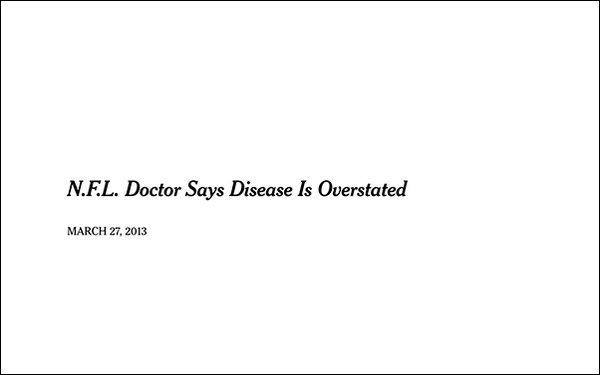
Launched just days before one of the sports
world’s biggest events of the year— the Super Bowl — The New York Times’ new ad, part of their “The Truth is Hard” campaign, focuses on traumatic brain injury, a topic that has plagued both the league and its players for the past few years.
The NYT has been a frontrunner in reporting the tragedy that results from Chronic Traumatic Encephalopathy, or CTE, a progressive degenerative brain disease caused by repeated traumatic
injury to the head.
advertisement
advertisement
More narrative in theme than previous ads, the latest follows Junior Seau, a former NFL linebacker who suffered from CTE and died from suicide at age 43 in 2012. It charts
his rise from NFL draft pic through his career, death and the discovery of his brain disease.
The NYT’s headlines are displayed in bold against a simple white background, with
audio of a game-day crowd, before falling into silence.
The newspaper has been involved in a decade-long investigation into the effects of repeated brain trauma on football players. As a
result, its journalism has led to changes in the game while revealing bogus science and the human impact to families of players.
When asked about the lasting impact of the
NYT’s investigative work into CTE, Jason Stallman, the paper's sports editor, told Publishers Daily: “It seems unmistakable at this point that our reporting has
forced the NFL to change the rules of the game and all of its protocols for handling head injuries, and forced the NFL to upend its concussion committee after we exposed profound flaws in their
work.
"It forced the NFL to finally acknowledge that repeated blows to the head sustained in football are linked to long-term cognitive problems and persuaded youth and college programs to
change their rules and protocols. It persuaded parents to consider the physical toll of the sport, and spurred more researchers to explore the affects of hits to the head on athletes.”
The ad is the first in a series planned to launch over the coming weeks highlighting other investigative sports work. They include stories on Russian doping at the 2014 Sochi Winter Olympics and
the FIFA officials corruption scandal uncovered in 2015.